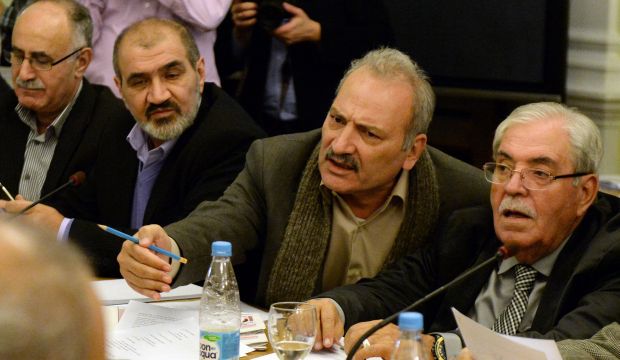
Negotiators attend talks between representatives of the Syrian government and the opposition in Moscow on January 28, 2015.
(AFP Photo/Vasily Maximov)
Moscow, Asharq Al-Awsat—Moscow is the only place where the Syrian opposition and the government of President Bashar Al-Assad can negotiate a political settlement for the Syrian conflict, Russian Deputy Foreign Minister Mikhail Bogdanov told Asharq Al-Awsat on Wednesday.
Members of various Syrian opposition factions gathered in the Russian capital on Monday in an attempt to find common ground ahead of their meeting with representatives of the Damascus government scheduled for January 29.
The majority of participants are members of Syria-based opposition groups tolerated by the government. The Syrian National Coalition, an umbrella organization of exiled opposition groups, rejected Russia’s invitation earlier this month on the grounds that it is a staunch backer of Assad.
Despite this setback, Bogdanov maintained that talks in Moscow represent the best chance for a negotiated solution to the crisis in Syria, which has seen millions of Syrians displaced and at least 200,000 killed since 2011, according to UN estimates.
“Moscow is the only place in the world that can bring together all opposition factions [including the Muslim Brotherhood] and the Syrian government,” Bogdanov said. Unlike the Friends of Syria group, which only invites the Western-backed coalition to its meetings, Russia has called on almost all opposition factions from across the spectrum, he maintained.
“Remember that the Friends of Syria meeting only invited representatives from the Coalition. But Moscow set all goals in the text of the invitation which was sent to all concerned Syrian factions and emphasized that the Geneva Communique, which was issued on June 30, 2012 and approved by the UN Security Council resolution 2118, is the only option for reaching a political settlement.”
The Geneva Communique, which was signed by a number of world powers and Arab League members in 2012, calls for the establishment of a transitional body with full executive powers. The Coalition insists that there should be no place for Assad in the future Syria.
“Those who accuse Moscow of failure should attempt to do what we have done,” Bogdanov told Asharq Al-Awsat, responding to attempts to play down the importance of the talks in the light of the Coalition’s boycott.
Russia says it will maintain a neutral position throughout the talks.
“Let Syrians agree among themselves. If they fail to reach an agreement on a solution, they will continue fighting, killing each other and destroying their country should it suit them,” Bogdanov said.
He warned that the armed conflict in Syria may drag on for years to come unless rivals negotiate a peaceful solution.
“Did not the war in neighboring Lebanon continue for 16 years? The fighting between them [Syrians] may continue for the same period should war appeal to them.”
On Wednesday, Russian Foreign Minister Sergey Lavrov met with participants in the talks and called on them to unite against terrorism.
Bogdanov also cast doubts on US plans to train and equip some 5,000 moderate Syrian rebels to fight government forces and terrorist groups such as the Islamic State of Iraq and Syria (ISIS) and Al-Nusra Front.
“We can wait to see how those fighters will later join the ranks of terrorist groups, particularly ISIS,” he said.
The official urged the UN and the countries “capable of influencing the Syrian government and opposition . . . to shift [efforts] towards negotiations.”
“We welcome the participation of all neighboring countries, including the Kingdom of Saudi Arabia, Turkey, Iran, Lebanon, Jordan—home to millions of [Syrian] refugees—and Qatar.”
